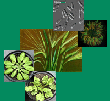| Wojas, S; Clemens, S; Hennig, J; Sklodowska, A; Kopera, E; Schat, H; Bal, W; Antosiewicz, DM: Overexpression of phytochelatin synthase in tobacco: distinctive effects of AtPCS1 and CePCS1 genes on plant response to cadmium., Journal of Experimental Botany, 59, 2205-2219 (2008), doi:10.1093/jxb/ern092 | |
| Abstract: Phytochelatins, heavy-metal-binding polypeptides, are synthesized by phytochelatin synthase (PCS) (EC 2.3.2.15). Previous studies on plants overexpressing PCS genes yielded contrasting phenotypes, ranging from enhanced cadmium tolerance and accumulation to cadmium hypersensitivity. This paper compares the effects of overexpression of AtPCS1 and CePCS in tobacco (Nicotiana tabacum var. Xanthi), and demonstrates how the introduction of single homologous genes affects to a different extent cellular metabolic pathways leading to the opposite of the desired effect. In contrast to WT and CePCS transformants, plants overexpressing AtPCS1 were Cd-hypersensitive although there was no substantial difference in cadmium accumulation between studied lines. Plants exposed to cadmium (5 and 25 muM CdCl2) differed, however, in the concentration of non-protein thiols (NPT). In addition, PCS activity in AtPCS1 transformants was around 5-fold higher than in CePCS and WT plants. AtPCS1 expressing plants displayed a dramatic accumulation of gamma-glutamylcysteine and concomitant strong depletion of glutathione. By contrast, in CePCS transformants, a smaller reduction of the level of glutathione was noticed, and a less pronounced change in gamma-glutamylcysteine concentration. There was only a moderate and temporary increase in phytochelatin levels due to AtPCS1 and CePCS expression. Marked changes in NPT composition due to AtPCS1 expression led to moderately decreased Cd-detoxification capacity reflected by lower SH:Cd ratios, and to higher oxidative stress (assessed by DAB staining), which possibly explains the increase in Cd-sensitivity. The results indicate that contrasting responses to cadmium of plants overexpressing PCS genes might result from species-dependent differences in the activity of phytochelatin synthase produced by the transgenes. |

